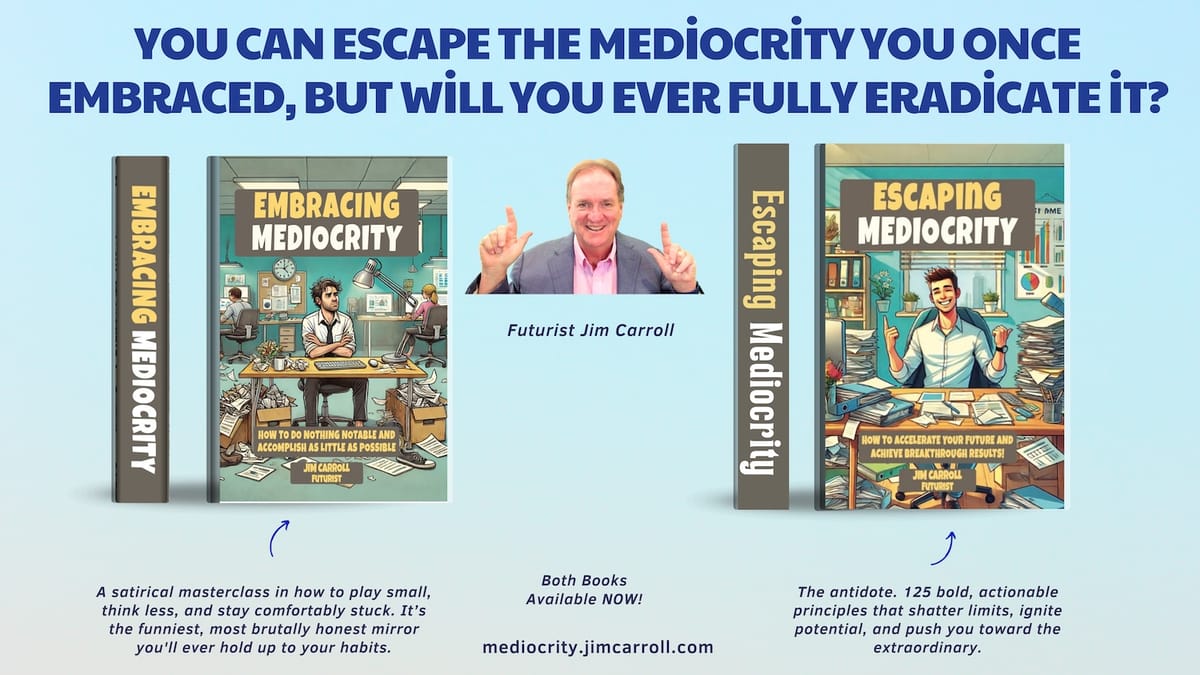“You can escape the mediocrity you once embraced, but will you ever fully eradicate it?" - Futurist Jim Carroll
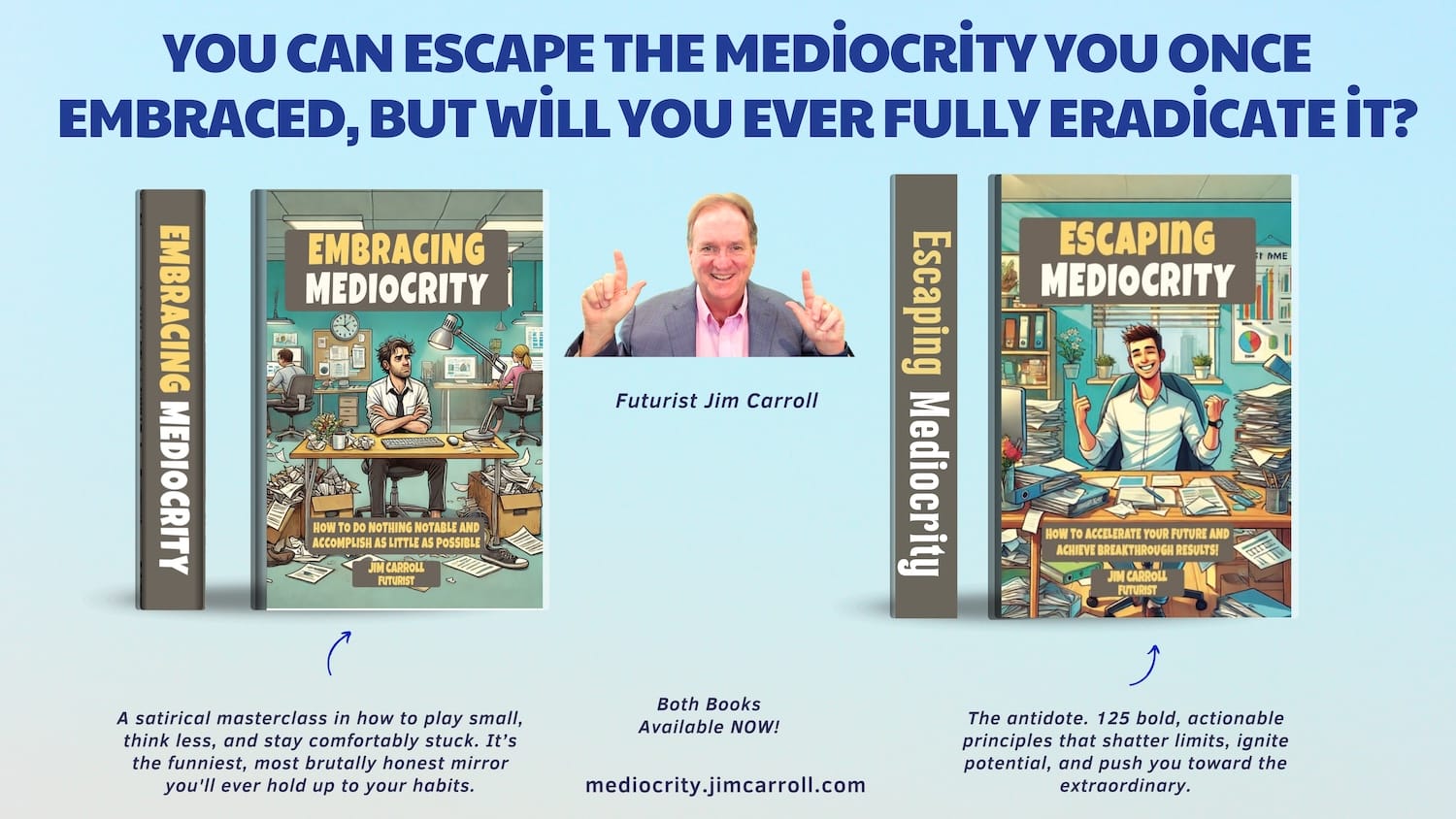
It's been a wild voyage bringing these two books to print in just a few months, and I'm loving the feedback and comments from those who have picked up copies. (Are you in? You can grab copies at the Mediocrity website !)
But while working on them, I'm always thinking. At first, I put together Embracing Mediocrity to identify the attitudes and actions that cause so many people to live a mediocre life. Once that was becoming a reality, I realized I needed a way to offer people a path out of such an existence, which led of course, to the creation and release of Escaping Mediocrity.
But I must admit, I'm kind of bugged. Let's say you manage to escape the mediocrity you once embraced, but what if it came creeping back? What if the old bad behaviors, mindsets, and beliefs that drove you before come back into your mind, even though you've worked so hard to escape them?
I realized what you need to do is eradicate them.
So I started thinking about how you eradicate mediocrity, and I came to realize that what it would involve is coming to accept some ground truths about your situation and your reality.
So I started compiling a list. Let's call it a list of 101 Principles of Leadership and Innovation. They seem to neatly fall into several buckets or categories, so I've included that in the list. Or maybe it's a list about, um, I dunno, eradicating mediocrity? Maybe you should read the post to the bottom!
There is, of course, a PDF, which I pulled together with my nifty new little AI deck generation tool!
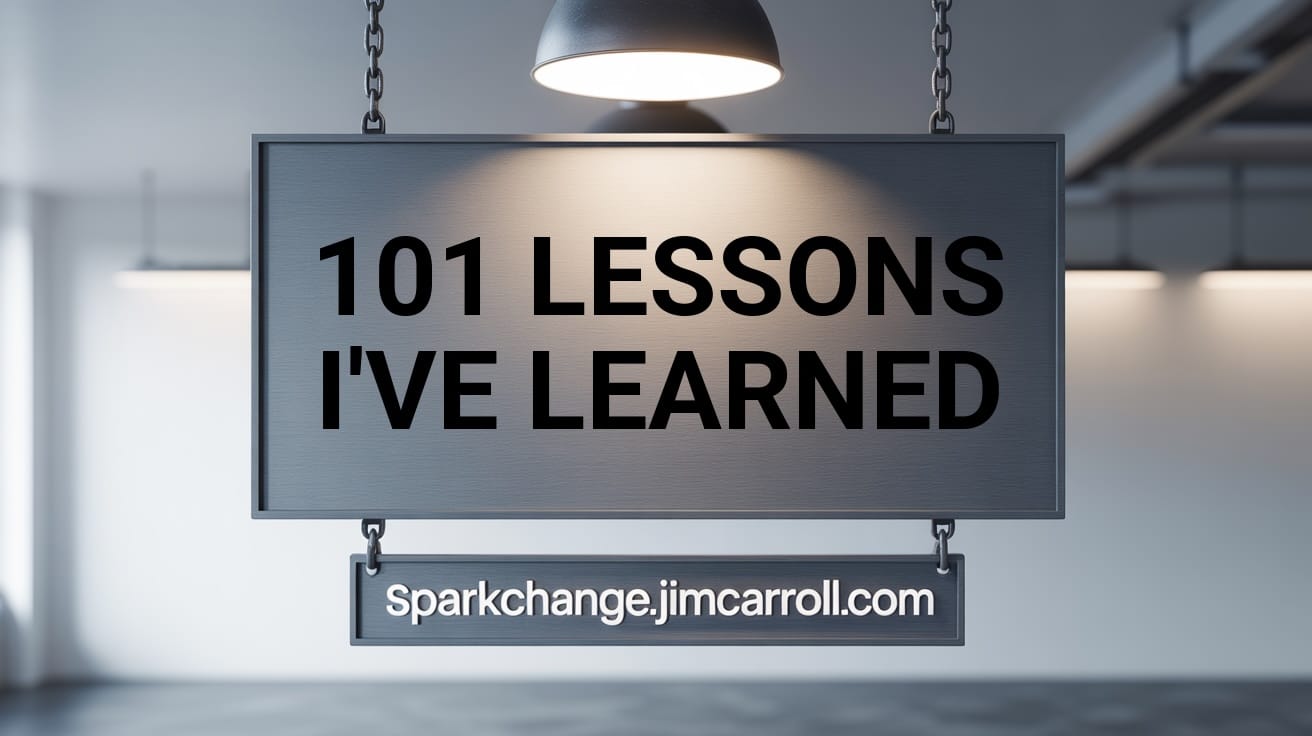
Oh, and there's a Website that I generated with AI - it's at sparkchange.jimcarroll.com - entirely generated by AI. Visit it!
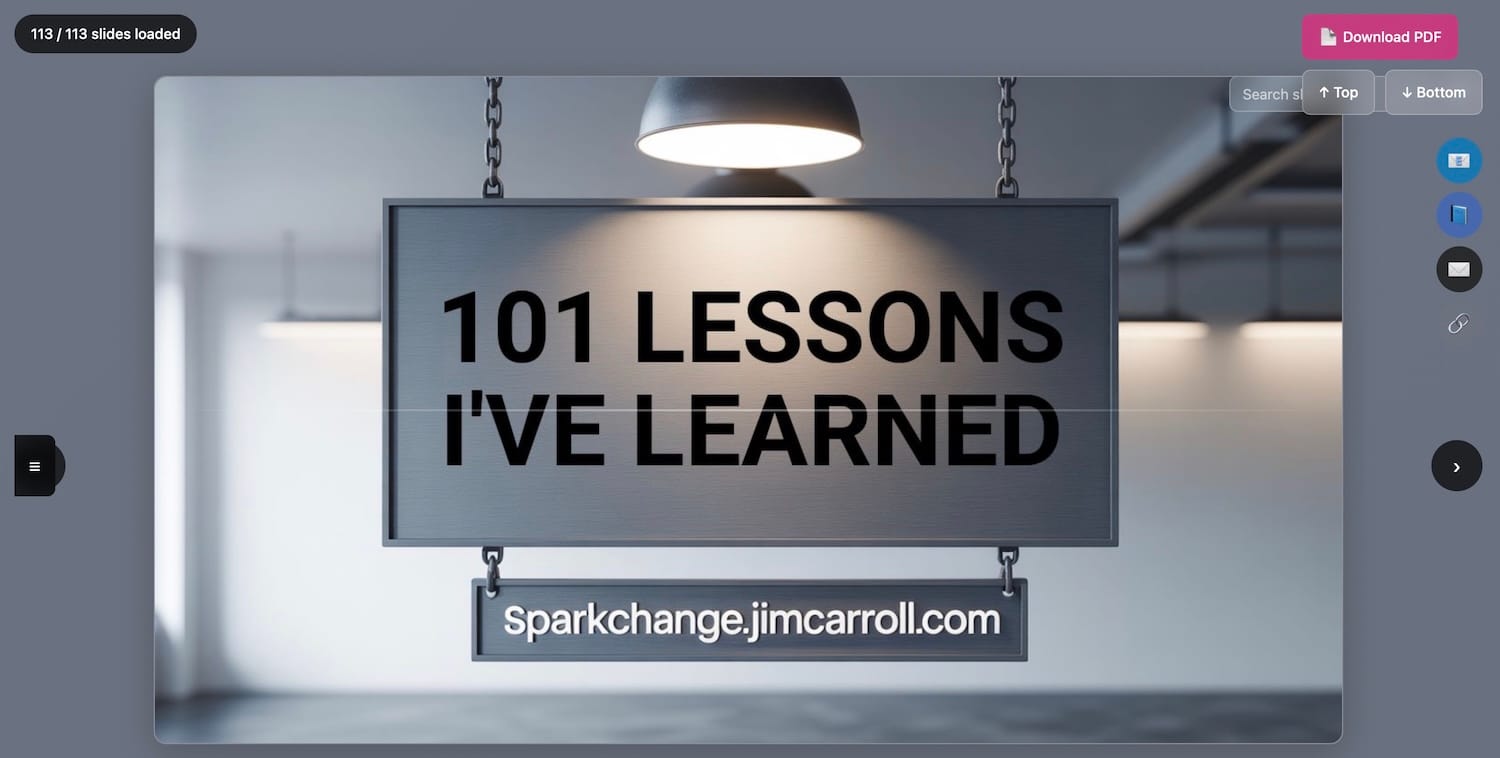
Here's the list!
SPEED AND ADAPTABILITY
- The Future Belongs to Those Who Act Fast
I've presented to leadership teams across industries: banking, agriculture, aerospace, and observed a pattern. Those who thrive act quickly, not just think fast. Speed consistently outperforms size. - Disruption Is Already Here, So Start Moving Now
I call this the acceleration era for good reason. Industries are transforming while people still "wait and see." That's not planning, that's choosing irrelevance in today's fast-moving world. - Fear of the Future Shows You Are Unprepared
My keynote polls reveal many aren't confident about the future. This anxiety stems from not understanding what's coming. Knowledge consistently overcomes fear when facing uncertainty. - Don't Brace for Impact, Build for Acceleration Instead
Too many organizations approach change like a collision. I encourage them to shift their perspective. Change isn't something to endure. it's your runway for opportunity and growth. - Speed Is Not the Risk, Stagnation Is Dangerous
Product lifecycles have shortened by nearly 40% in a decade. Innovation cycles once measured in years now unfold in quarters, sometimes even weeks in today's accelerating marketplace. - Agility Beats Strength When the World Is Shifting
The most successful companies I engage with maintain lean teams and quick decisions. Success comes not from headcount but from maintaining momentum through changing conditions. - Change Before You Have to, Not When Forced
I warned clients about the 2008 recession before it hit. Those who listened were implementing changes while others faced collapse. Waiting until forced to change puts you behind. - You're Not Too Late, You're Just Too Slow
There's always time if you move decisively. Companies pivoting early in the pandemic didn't merely survive, they flourished. Quick action beats running out of time every day. - Innovation Hates Caution, Be Bold or Be Forgotten
I've watched rooms go silent saying this: your future won't emerge when every idea requires committee approval. Bold consistently outperforms bureaucracy in the innovation race.
MINDSET AND LEADERSHIP
- You Can't Lead Tomorrow with Yesterday's Logic Now
You'd be surprised how many leadership teams build strategies on expired assumptions. Legacy thinking becomes your anchor, weighing down potential. Cut it loose to advance. - The Best Ideas Usually Start in Uncomfortable Places
Learning to ski in my thirties was terrible initially, but I persisted. That discomfort signals potential. Worthwhile ideas rarely feel comfortable at first: if they do, reconsider their value. - Fear Acts as a Brake While Curiosity Fuels
Every trend contains threats and opportunities. Most fixate on threats, but innovators ask questions and explore. Curiosity opens doors that fear keeps firmly closed in changing times. - Don't Benchmark Against Industry, Leap Beyond It All
The worst trap is watching competitors instead of future trends. I tell leaders: that tracking only the industry you operate in means you're behind. Look across sectors for tomorrow's innovations. - Culture Beats Tools, Tech, and Titles Every Time
The most innovative teams don't always have flashy resources, but their mindset excels. Culture forms the foundation everything else builds. It's your ultimate competitive advantage. - Bureaucracy Is Just Fear Wearing an Official Badge
I've heard every delay excuse: process, protocol, policy. Strip away the layers and find fear. Organizations transform from stuck to soaring by simply removing unnecessary complexity. - Stop Calling It Disruption, Start Calling It Evolution
Disruption sounds external, happening to you. The future unfolds through our actions. I tell audiences: "The future isn't happening to you. It's happening because of you." This perspective creates momentum. - Small Ideas Scale, Big Ones Stall, Start Moving
The best ideas I've seen succeed began modestly, not grandly. Small wins built momentum that drove major change. Launch something manageable, learn quickly, and then expand its impact.
EXECUTION AND STRATEGY
- A Strategy That Ignores Change Is Just Hope
You can't chart your future using outdated maps. I've met executives using pre-digital assumptions.Strategy should evolve alongside markets. Otherwise, it's just nostalgia dressed as planning. - Being Busy Isn't Progress, Output Isn't Outcome Yet
I've entered rooms full of sticky notes and dashboards showing little results. Progress means impact, not busyness. Measure what truly matters and stop everything else. - You Cannot Scale What You Don't Launch First
I've witnessed brilliant ideas stuck in endless planning. Nothing grows until something ships. Start small if necessary, but begin. Dreams that stay in spreadsheets never scale up. - Experimentation Is Your Best Strategy for Forward Movement
Companies that learn fastest win consistently. I've seen organizations move from concept to insight within days through quick, imperfect tests. Perfection blocks valuable learning opportunities. - If It's Not Breaking Something, It's Not Innovation
Innovation creates friction and discomfort, and that's a great thing! Without nervousness, you're merely improving, not transforming. One CEO called this "productive discomfort," and he was right. - Kill Your Sacred Cows, They Are Slowing Progress
There's always something existing solely because it always has. I've helped clients eliminate legacy procedures, saving months of waste. "We've always done it this way" signals opportunity. - Creativity Comes From Constraints, Not From Unlimited Resources
I've seen brilliant teams excel not with unlimited resources but with strict constraints. Limitations create focus, and focus drives innovation when teams must solve problems creatively. - The Biggest Barrier to Innovation Is Your Team
Progress typically stalls from silos, outdated thinking, and turf wars, not competition. You don't need better markets but more open mindsets that welcome necessary change. - Complexity Kills Momentum, Simplify Everything You Can Do
I worked with a healthcare organization whose onboarding had 22 unnecessary steps. Trimming to eight increased satisfaction dramatically. Simplicity scales while complexity stalls growth. - Don't Admire the Problem, Solve It Right Now
Some leaders spend all their time analyzing issues without acting. Naming problems isn't fixing them. The future belongs to action-takers. Begin messy, and refine as you progress. - Progress Is Optional, So Is Becoming Irrelevant Today
One hard truth I tell audiences: yesterday's relevance guarantees nothing tomorrow. You must continually earn your place through adaptation and forward movement in changing markets. - What You Tolerate Defines Your Trajectory Moving Forward
Culture isn't wall posters - it's the mindset you adopt day to day to do to move forward. Allowing mediocrity to creep in means you won't be innovative, because standards remain low throughout your organization. - Good Enough Isn't Good Enough, Not Anymore Today
Customer expectations have never been higher in history. What once delighted barely satisfies now. If "good enough" is your standard, competitors will exceed it and claim your market. - You Don't Need More Ideas, You Need More Action
Every team I work with has plenty of concepts. That's never the problem. The challenge is implementation. Innovation happens through execution at speed, not accumulating unused ideas. - Success Leaves Clues, Don't Copy, Adapt Them Now
I once advised: don't copy someone else's playbook exactly. Learn from it, then customize it. Copying creates sameness while adaptation builds competitive advantage through differentiation. - Process Should Accelerate People, Not Bury Them Alive
When top talent spends more time navigating rules than solving problems, your process needs fixing. Address this first, then watch your people's capabilities shine through unhindered. - Strategy Is a Verb, So Act Like It
Strategy isn't PowerPoint slides but Monday morning actions. I've watched excellent plans die without implementation. Movement matters more than intentions that remain theoretical and unused. - The Fastest Path to Innovation Starts Anywhere Now
I've coached teams where breakthroughs came from unexpected places, not boardrooms. Don't wait for perfect starting points. Just begin somewhere. Energy is generated from initial action.
CUSTOMERS AND MARKETING
- Stop Assuming What Customers Want, Ask Them Directly
One retailer I advised doubled their NPS score using simple micro-surveys and quick responses. Most organizations are just one conversation away from transformative insights about their customers. - The Market Doesn't Care About Your Legacy Systems
I've heard countless times: "our platform prevents this." That's a choice, not a limitation. Customers see only friction, not your backend challenges that should remain invisible to them. - Relevance Has a Shelf Life, So Keep Evolving
Today's advantage becomes tomorrow's standard offering. I often say success breeds complacency, and complacency eventually breeds disruption by more innovative competitors watching your market. - If You're Bored, Your Customers Are Too Probably
Team energy directly affects the customer experience. When staff feel stuck in routines, it shows. I helped revitalize a digital platform by empowering frontline staff to redesign it. - The Next Big Thing Is Already Late, Act Now
If something appears in trend reports, others are implementing it. Winners don't chase what's popular now but build what's next. I tell executives: "Reacting today means you're already behind." - Customers Reward Momentum, Not Nostalgia From the Past
The most dangerous executive phrase is "We've always done it this way." History won't maintain loyalty. Only your next innovations will. Brands coasting on past wins lose to faster competitors. - Brand Strength Today Is Built on Quick Adaptation
Markets move rapidly. Strong brands adapt faster than competitors. One global client updated positioning four times in two years while revenue consistently grew. Flexibility outperforms rigidity. - Value Isn't What You Sell, It's How You Change
One B2B client transformed from product sales to subscriptions in under 18 months, increasing customer spending. What you become matters more than what you began as in today's market. - Listening To Customers Is Your Best Innovation Engine
I asked one CEO how often he heard directly from customers. His hesitation answered everything. Frontline insights are your hidden R&D department. Collect them or fall behind. - Experience Beats Product Every Time In Customer's Mind
Customers rarely remember specifications but remember how interactions felt. I've seen average products succeed by delivering exceptional care, simplicity and responsiveness that competitors lacked.
ORGANIZATIONAL RESILIENCE
- Volatility Is Your Proving Ground, Not Your Enemy
Any company appears smart during prosperity. True resilience emerges during the chaos. Organizations emerging stronger from downturns didn't freeze - they adapted while others remained paralyzed by uncertainty. - Resilience Isn't Bouncing Back, It's Leaping Forward Fast
After 2008's recession, one manufacturing client retooled production during downtime. They didn't just recover, they advanced significantly. Real resilience creates new capabilities, not restores old ones. - Risk Isn't What Breaks You, It Shapes You
Too many companies avoid all risks, inadvertently avoiding progress. The best teams aren't reckless but embrace measured experimentation. Properly managed risk becomes growth's companion and catalyst. - Build For Flexibility, Not Just For Pure Efficiency
Lean systems excel until they become brittle. In rapid markets, pivot capability matters as much as cost-cutting. Agile organizations switch directions quickly because they maintain flexibility. - Chaos Is a Signal, Not a Stop Sign
Every crisis reveals weaknesses or blind spots. Smart leaders use these moments to learn and reposition. They build stability through action rather than waiting for conditions to improve.
TALENT AND TEAM DYNAMICS
- Great Teams Don't Need Permission to Innovate Today
The most dynamic workplaces allow experimentation without committee approval. Freedom ignites creativity. One staff member built an app that saved 6,000 labor hours annually without seeking permission first. - Hire For Learning Ability, Not Just Existing Knowledge
Skills become outdated. Curiosity doesn't expire. Top performers ask better questions rather than knowing all the answers. LinkedIn shows that 94% of employees stay longer at learning-focused companies. - Diverse Teams Imagine Broader Futures Than Homogeneous Ones
Innovation requires varied perspectives. Like-minded teams don't solve problems, they reinforce them. McKinsey found diverse teams outperform homogeneous ones by 35% through broader thinking. - Collaboration Beats Hierarchy Every Time In Innovation Race
Breakthroughs rarely originate from the top. They come from those feeling safe to speak. I've seen million-dollar savings initiated by warehouse employees in psychologically safe environments. - Trust Is the Ultimate Accelerant For Organizational Change
Organizations transform rapidly when they stop second-guessing their people. Trust drives velocity and results. High-trust companies outperform low-trust competitors by up to 186% in shareholder returns. - Psychological Safety Builds Real Creativity In Every Team
If people fear mistakes, they avoid bold ideas. Google's research identified psychological safety as the top predictor of effective teams through encouraging authentic contribution. - Accountability Without Autonomy Is Just Micromanagement In Disguise
I've watched talented people burn out from responsibility without authority. Effective teams pair ownership with appropriate freedom to determine how goals are achieved through individual approaches. - Talent Doesn't Grow Under Pressure, It Grows With Purpose
Pushing harder rarely works. Give people meaningful goals to achieve and they'll exceed expectations. Purpose unlocks discretionary effort that pressure can never access or sustain. - Teams Thrive on Clarity More Than Anything Else
The best innovation environments share a common element: people understand what matters. They know goals, boundaries, and purpose. Without clarity, energy scatters. With it, efforts focus effectively.
EXPERIMENTATION AND LEARNING
- Innovation Isn't a Department, It's a Culture Everywhere
If only specialized teams "innovate," everyone else merely executes. Leading companies embed innovation across all roles and levels, creating distributed capability rather than isolated expertise. - Experimentation Isn't Risk, It's Rehearsal For Success Tomorrow
Innovative companies treat each test as a rehearsal for what's ahead. They fear stagnation more than failure. Breakthroughs require continuous trial and adjustment in every market. - You Learn More From Rough Drafts Than Perfect Delays
One executive waited six months for a polished launch while competitors launched imperfectly and won. Imperfect action beats perfect planning when markets move quickly. - Innovation Is Iteration, Not a One-Time Perfect Event
No idea succeeds perfectly initially. Every breakthrough I've witnessed emerged through feedback cycles and pivots. Innovation isn't a single launch but continuous improvement loops responding to reality. - Feedback Is a Gift, Especially When It Stings
One startup almost ignored harsh user feedback that proved invaluable. Painful insights often contain breakthrough opportunities that comfortable feedback rarely reveals about your blind spots. - Curiosity Is Your Innovation Engine That Never Stops
Top-performing teams ask more questions than they answer. They explore unusual data and test seemingly absurd ideas. Curiosity finds growth opportunities in overlooked places others miss completely. - Your Next Big Idea Already Exists Somewhere Else
Cross-industry innovation remains underutilized. The best teams examine aerospace when in agriculture, or logistics when in healthcare. Borrowing brilliance from unexpected sources creates fresh approaches. - Build Fast, Test Cheap, Learn Always From Everything
I worked with retailers who created seventeen digital mockups in fourteen days. Most failed, but one generated millions. Making learning cheaper than market failure drives sustainable innovation. - Ask Better Questions to Get Much Bolder Answers
Teams stuck in patterns recycle the same questions endlessly. Powerful questions like "What if we started over?" or "What are we ignoring?" create breakthroughs when conventional thinking fails. - Learn Faster Than the World Changes Around You
Knowledge decay accelerates daily. Skill half-lives keep shortening. Companies that thrive learn, unlearn and relearn faster than market changes through systematic knowledge practices. - Make Space For Ideas Before You Need Them
You can't brainstorm effectively during crisis. Prepare your thinking environment before pressure hits. Successful organizations practice future thinking during calm periods to prepare for turbulence.
FUTURE-FOCUSED MINDSETS
- The Future Isn't a Destination, It's a Decision
Smart leaders don't merely predict what's coming but decide their direction and build toward it. One bank reinvented its service model not from necessity but from choice. - The Pace of Change Will Never Slow Down Again
If today seems fast, prepare yourself for more. I tell audiences: today is the slowest day you'll experience. Adaptability isn't optional anymore. It's a fundamental infrastructure for lasting success. - Anticipation Beats Adaptation Every Time In Changing Markets
Reaction always comes too late. Thriving organizations don't respond to disruption, they create it. They detect early signals and move before competitors even recognize the opportunity. - Trend-Watching Is Leadership Insurance Against Being Blindsided
I've seen companies completely surprised by foreseeable changes they missed. Your awareness radar is your risk management system. Track significant patterns or face avoidable setbacks. - Your Comfort Zone Is Your Kill Zone Eventually
When things feel easy, I warn leaders to worry. Comfort breeds stagnation quickly. Leading organizations constantly push into unfamiliar territory because that's where growth opportunities exist. - Tomorrow's Competitors Aren't Your Rivals Today Usually
A major strategic blindspot is focusing only on traditional competition. Real threats often come from startups or different industries entirely. One legacy client was overtaken by a player they dismissed. - Legacy Is What Holds Most Companies Back Today
The primary barrier isn't talent or technology deficits but the weight of established patterns. Innovation happens by stopping the past from controlling your future through deliberate choices. - Reinvention Is a Habit, Not a Reaction To Crisis
The best organizations don't wait for problems to change direction. They build reinvention into their operational rhythm. It's not an occasional pivot but continuous practice throughout the organization. - Fast Beats Future-Proof Every Time In Real Markets
There's no such thing as locking in tomorrow. Attempting to "future-proof" creates rigidity. Instead, develop adjustment speed. Resilience comes from agility, not from attempting perfect prediction. - The Future Rewards the Ready, Not the Lucky Ones
I've repeatedly observed that winning teams aren't necessarily the most brilliant or well-funded. They're simply more prepared to execute. Readiness is a deliberate choice, not a fortunate accident.
ACTION AND EXECUTION
- Innovation Happens When You Decide to Act Now
It's not about brainstorming sessions but converting "we should" into "we did." Too many excellent ideas die in meeting rooms. Survivors are those who decide to implement immediately. - You Can't Build Momentum Without Moving First Now
Strategy retreats won't create first steps. Progress comes from pushing the flywheel, not analyzing it. I tell every audience: momentum matters more than mastery when starting anything new. - Kill the Meeting, Start the Doing Right Away
If your team discusses innovation more than practicing it, you have meeting problems, not creativity issues. One client replaced weekly discussions with weekly prototypes and tripled results. - Start Before You Feel Ready, That's the Secret
Every successful leader I've met admits they never felt fully prepared. They moved forward anyway. Waiting for perfect timing guarantees missing opportunities that reward early action. - Prototypes Speak Louder Than Promises Ever Will Today
Stop talking about future actions. Demonstrate them instead. A rough working version outperforms polished presentations consistently. One keynote observation: "Working demos beat white papers by miles." - Action Creates Clarity That Planning Never Can Alone
I consistently advise: that the mere act of thinking won't deliver certainty. Only action provides insight. Most teams find direction through doing, not through extended planning sessions that postpone real learning.
COURAGE AND CONVICTION
- The Biggest Risk Is Playing It Safe Right Now
The world doesn't slow down for caution. Bold decisions create the impact necessary for leadership. Over half of Fortune 500 companies since 2000 disappeared by playing too safely too long. - Don't Wait for Consensus, It Never Arrives On Time
Requiring complete agreement guarantees paralysis. The best ideas often sound ridiculous before becoming obvious. I've witnessed billion-dollar innovations starting with one determined individual facing skepticism. - Defend Your Crazy Ideas, They Might Be Brilliant
Many breakthrough concepts faced initial mockery. Innovation often sounds wrong before proven right. I frequently remind clients: "If it makes everyone comfortable, it's probably not innovation." - Say Yes More Often to See What Happens
Innovation requires possibility. Reflexive rejection closes doors that smart affirmation opens. I challenged one client to approve ten small ideas monthly. Two became revenue-generating products quickly. - Stand For Something, Even When It Gets Hard
Your future won't come from blending in but from bold differentiation maintained through difficulties. Organizations that endure don't follow trends, they shape them through consistent distinctive positions. - Lead So Others Can Lead Too In Your Wake
The best leaders I've encountered focus less on personal brilliance than on enabling others. One CEO told me: "My job isn't being right but helping others become brave."
PURPOSE AND LEGACY
- Your Legacy Isn't What You Built, It's Who You Empowered
People forget strategic plans but remember how you made them feel capable. Leaders often tell me their proudest achievement wasn't launching products but mentoring those who did. - The Best Thing You Leave Behind Is a Mindset
Technologies and markets constantly change. A persistent way of thinking endures. Culture compounds over time. It's your most significant long-term investment in organizational success. - Leadership Is an Invitation to Be Better Every Day
Leadership transcends titles. It's a daily invitation to grow, learn, and establish expectations. You're not just directing strategy but modeling possibilities that others will follow through example. - The Future Is a Choice, So Choose Action Now
Each day presents options: wait or move. The future rewards motion, not hesitation. Choose wisely. This mindset I've shared with millions across fifty countries consistently proves accurate. - Share Your Lessons So Others Can Leap Forward
The fastest organizational momentum builder is transparency. One client created a weekly "fail forward" communication, dramatically boosting both engagement and experimentation throughout their company. - Legacy Isn't About Applause, It's About Real Impact
True success continues after you leave. One CTO's proudest moments was watching junior talent advance their ideas beyond original concepts, creating lasting change throughout the organization. - You're Not Here to Finish, You're Here to Spark
Innovation doesn't require perfection but ignition. Start the flame and others will sustain it. That's how transformation spreads beyond individual efforts into organizational movements. - Real Leadership Is Measured By What Happens After
Will your championed ideas continue? Will those you mentored lead others effectively? That's the authentic measure of leadership impact that extends beyond your direct involvement. - Build a Future Others Want to Join With You
Don't merely survive tomorrow. Shape it deliberately and include others. That represents leadership at its most impactful, creating futures people actively choose to help build alongside you.
I think it's a good list.
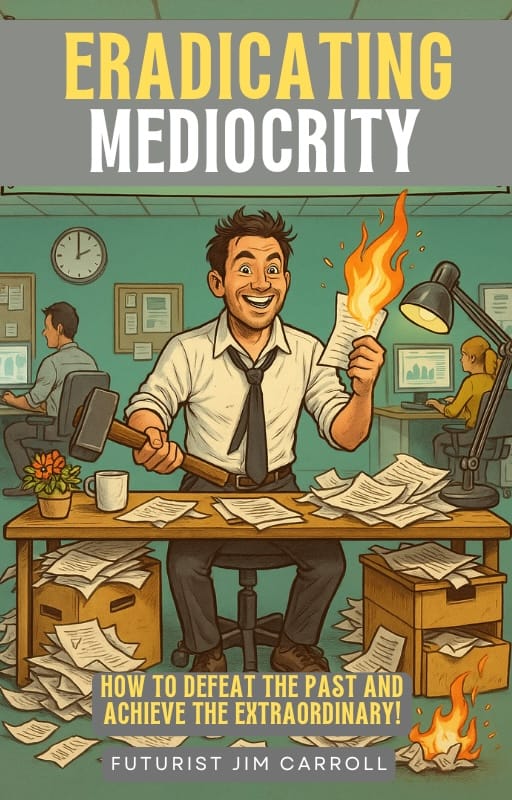
And I must say this: I'm tempted!
Futurist Jim Carroll has an idea percolating in his mind.

